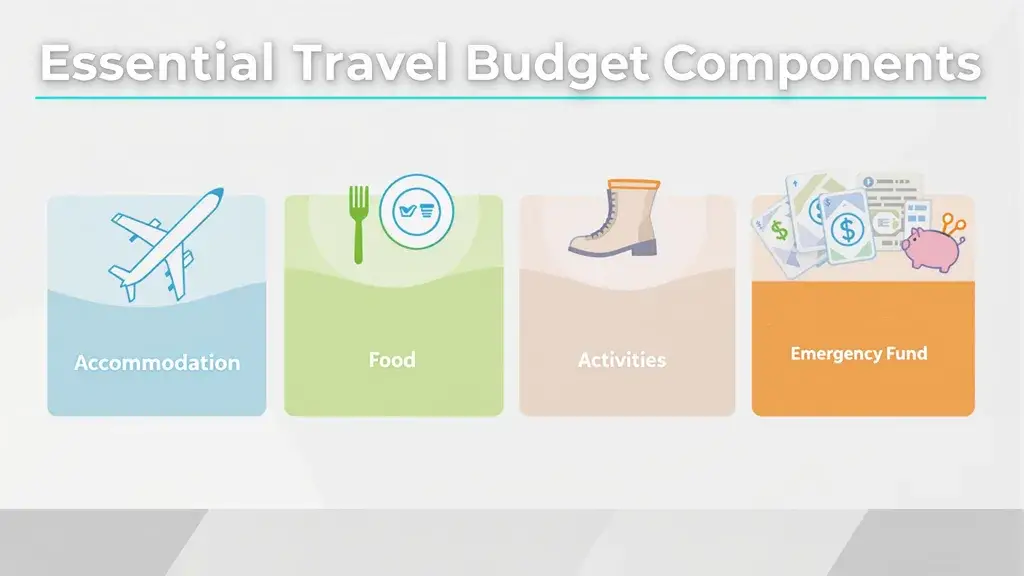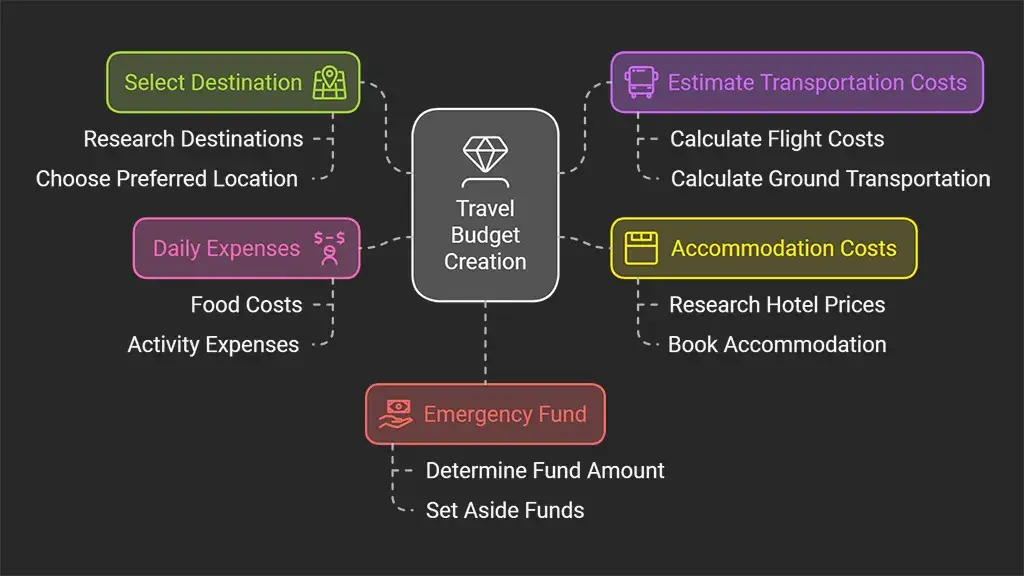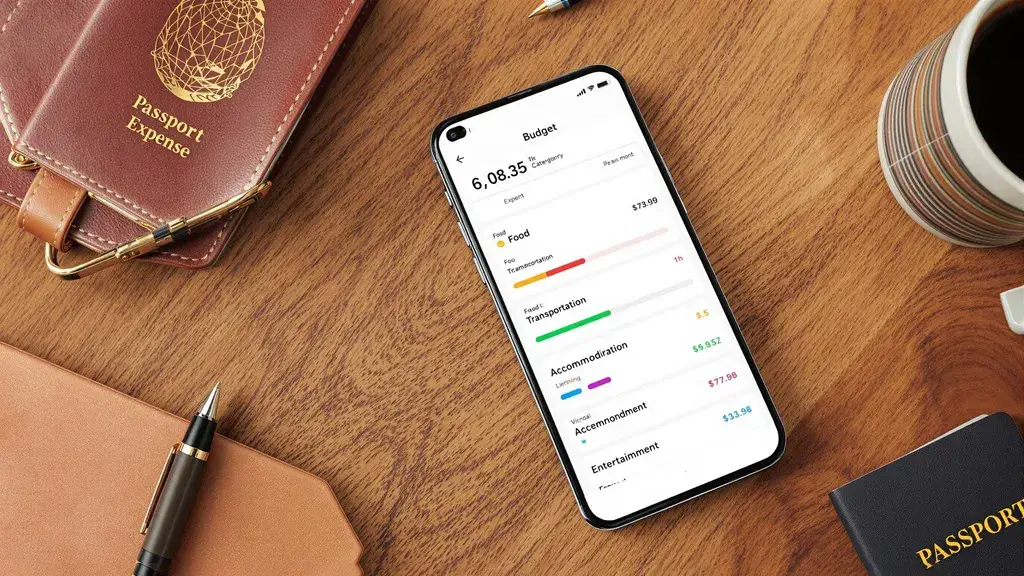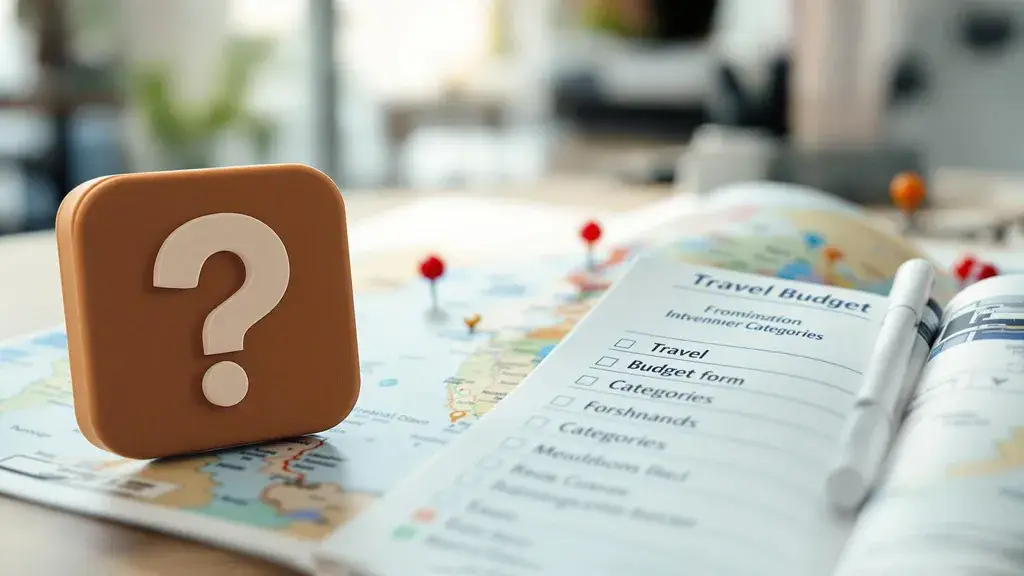Why a Travel Budget Matters
Where are you going on your dream vacation!” But this brings us to the big question: how much should I save to go on vacation? Travel budget making isn’t just numbers to crunch—this is your roadmap to stress-free travels and unforgettable experiences without worrying about overspending by using trip budget calculator.
A good budget allows you to break down your trip into easily digestible numbers, from flights to meals, so you never feel blindsided. It’s your instant vacation cost calculator: a way to inspire that itch to travel without losing track of your budget. Making arrangements in advance allows you to travel the best way to save money and make every penny count.
Behind the numbers, a budget with a plan brings peace of mind. Just imagine being able to visit your destination with the confidence that your finances are in order — it will make your trip much more enjoyable! Whether you’re putting away funds for a weekend getaway or a bucket-list adventure, the right budget allows you to travel smarter and enjoy every moment.
Ready to get started? So, let’s get into how to make your travel dreams a reality without going bankrupt. You’ve got this!
Who Needs a Travel Budget?
The short answer? Everyone! A travel budget is a lifesaver if you’re getting ready for a weekend getaway, planning a family vacation, or going on a long-term adventure. A detailed budget guarantees you can concentrate on creating memories and not worry about money. Now, here’s the thing—everyone has a different budget, and that’s perfectly fine!
For shorter trips, a vacation budget calculator can assist you in budgeting for essentials like lodging, transport, and meals while still allowing some wiggle room for little luxuries. Suppose you have your sights set on long-term travel or full-time adventure. In that case, a trip budget calculator becomes your closest companion, allowing you to keep tabs on ongoing costs, including lodging, visas, and even unexpected expenses.
It’s not about deprivation — it’s about freedom — and if you do it right, you’ll know you can afford that cart of groceries without going overboard. When you know your finances, you can prioritize what’s important to you, whether it’s eating at that restaurant on your bucket list or staying a few extra days. For whatever direction you’re going, budgeting allows you to travel smarter and with confidence.
Essential Components of a Travel Budget

Setting a travel budget shouldn’t be overwhelming. If you plan a budget carefully, your trip will remain stress-free and spade full of memories. So, let’s take it easy and break this down into the simplest steps:
- Transportation:
Flights, trains, car rentals, local rides: transportation is frequently your largest expense. Use a trip budget calculator to help you compare options, and don’t forget those hidden costs, such as luggage fees or tolls. Check fare comparison websites for deals or travel during off-peak times to save big. - Accommodation:
Lodging options, whether a luxury hotel, budget hostel, vacation rental, or campsite, also risk being widely disparate. Planning or taking advantage of loyalty programs can score you hefty discounts. A trip budget template can help make organizing these decisions easier and can help you determine what works with your style and budget. - Daily Expenses:
Think about meals, local transport, small daily expenditures, etc. Cost save by preparing your meals or dining where locals eat—it’s affordable and much more real. Use a travel budget worksheet to make it easy to track these expenses. - Activities and Entertainment:
Your experiences count! From tours in a museum to zip-lining. Limit your must-accomplish and look into free or discounted activities to get the most bang for your buck. - Souvenirs and Shopping:
Budget for those special mementos or gifts. Consider setting a spending limit to shop guilt-free without going over the top. - Communication:
Include the price of mobile data, SIM cards, or Wi-Fi access, particularly if you’re traveling outside the country. - Emergency Fund:
Life is unpredictable, and missed connections or medical needs may arise. An emergency fund means you’re ready for what you can’t predict.
Step-by-Step Guide to Building Your Travel Budget

Arranging a trip is thrilling, but paying for it? That’s where things can start to feel sticky. The good news is there are tools — like a trip budget calculator — that will help you break it down into bite-sized pieces. Here’s how to get started:
- Decide on Destinations and Duration:
First, you’ll need to decide your destination and duration. Look up average lodging, meals, and entertainment prices in each destination. This information is best organized on a trip budget template. - Estimate Transportation Costs:
It all adds up — from flights to trains and local commutes. Remember other expenses, such as baggage fees or gas for road trips. You should start looking up comparison sites as early as possible so you can get deals. - Plan for Accommodation Expenses:
Decide whether you’ll be in hotels, hostels, vacation rentals, or with friends. Shop for loyalty discounts or book in advance for the best rates. - Account for Pre-Departure Costs:
Consider the costs even before you set foot on an airplane —then renewals for passports, visas, vaccinations, travel insurance, etc. These can sneak up on you! - Set a Budget for Activities and Entertainment:
Want to scuba dive or go to a theme park? Break down it into things that must be done and their cost. Focus on what matters most to you. - Establish an Emergency Fund:
Life is unpredictable, so it’s wise to set aside part of your budget to cover the unexpected, such as medical expenses or delays. - Create a Savings Plan:
Once you know your total budget, make a savings timeline. For tracking your haul for motivation, use a travel budget worksheet.
Tools and Tips for Sticking to Your Budget

Being mindful of your travel budget doesn’t have to be a slog. With the right tools and some savvy strategies, you can keep on track without losing the fun.
Budgeting Apps and Tools
Trip budget calculators are a great starting point, but for tracking your spend in real-time, apps like Wallet or Travel Spend can be a true lifesaver. These apps allow you to record expenses on the fly so you always know where your money is going. For a less abstract approach, give an expense tracker printable or a weekly spending tracker a shot, mapping out your costs on a day by day basis.
Track and Adjust Spending
Track your expenses — daily or weekly — and make corrections as necessary. Overspent on dining? To offset such indulgence, plan a picnic lunch the next day. You’re all about being flexible, but you want to keep an eye on your overall budget—that’s where a trip tracker comes in handy!Track and Adjust Spending
Practical Savings Strategies
Be frugal: Book your transport and lodging ahead of time or travel off-season. And don’t forget to look for discounts on attractions and meals. Those little savings add up quickly, Heck with a little bit of see what discouragement, you will have even more room for impromptu adventures!
Practical Tips to Save Money While Traveling

Traveling doesn’t need to cost a fortune. With some clever planning, you can make the most of your budget and still have incredible experiences.
- Cook Your Own Meals:
Eating at a restaurant every day can be an expensive habit. Be sure to cook your own meals if you have access to a kitchen in your accommodation. Or try street food or casual joints for more cost-effective meals. This not only is a money saver, it also allows you to taste authentic local flavors. - Use Public Transport or Walk:
Skip the expensive taxis or ride shares and get on public transport like a local. Buses, trains and subways are often less expensive — and walking is free! It’s also one of the most effective ways to save money while taking in the scenery. - Look for Free or Low-Cost Activities:
Most destinations have free walking tours, public parks or low-cost attractions. For budget-friendly beach vacations in the US, search for free beach access and bring a picnic for an inexpensive day at the ocean.
FAQs: Addressing Common Concerns

How much to save for a travel budget?
Begin with a trip budget calculator to gauge your aggregate costs — transportation, lodging, food, activities. The longer your trip and the further away your destination, keep that in mind. It’s generally a good idea to factor in a little extra margin for surprises.
What if unexpected costs exceed my emergency fund?
This is something to be nervous about. To avoid any surprises, read up on how to calculate per diem for meals and daily expenses in your destination. Keep a credit card as emergency backup when you need one.
How do I save and also enjoy my trip?
Concentrate on what are some main factors of wise budgeting, as an example prioritizing memories that are very important to you. Cut back on less essential items (say, eating a fancy meal for every meal) in order to indulge in once-in-a-lifetime experiences.
Conclusion: The Path to Financially Savvy Travel

With a trip budget calculator by your side, you have the power to manage expenses confidently—leaving you free to create unforgettable memories. Budgeting isn’t about limiting yourself; it’s about opening up a world of options. Whether you’re saving for that once-in-a-lifetime journey or aligning your travel expenses with work policies, smart budgeting lets you travel smarter.
Ready to elevate your travel planning? Start today by crunching the numbers, setting realistic monetary goals, and preparing for the adventure ahead. And for a comprehensive roadmap on all things budget travel—including destination tips, cost-saving strategies, and more—be sure to check out our Budget Travel: Ultimate Guide To Wallet-Friendly Trips.
When you budget wisely, you not only save money—you ensure that every step of your journey is enjoyed to the fullest.



